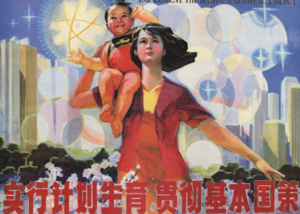Heralded as a powerhouse to propel the world into the future, China has long been regarded as having one of the most sound demographics to power its economy. Recently, the country has announced that it is lifting the controversial one-child policy, which has been in place since 1979 as a means to control the population at a time when China was still poor and undeveloped. However, remnant effects are being felt by the country in 21st century, in the form of a destabilized demographic.
What would happen when your family is told that you are only allowed one child, and in some cases at most one son after having a daughter, in a country where sons are traditionally viewed as being more virtuous than daughters?
(An old propaganda poster supporting One-Child Policy: “Executing the One-Child Policy Is A Part of the Country’s Foundamental Principles.”)
Some simple math will tell us that male babies born will outnumber the female ones, and this is exactly the problem Chinese Millennials and Gen Zs face as they approach adulthood. In his article, BC Cook outlined the threats he thinks the Chinese society faces as a result of the One-Child Policy. The most pronounced issue, he argues, is the problem of “online brides”, or brides from neighboring Asian countries who come over to be married to Chinese single men who cannot find a wife.
Now, online dating is not illegal, not even in China. “However,” Cook argues, “Chinese men finding foreign brides and starting families is exactly what the Chinese government was trying to avoid. So the one-child, male-only mandate from the government has backfired.”
On one hand, there is a markedly obvious imbalance in the “supply and demand” of domestic brides, as a direct result of the One-Child Policy. On the other, the Chinese philosopher Mengzi summarized in a proverb: “Dishonor to the family has three forms, and having no child is of the worst.”(不孝有三,无后为大)The Chinese traditional culture heavily focuses on the idea of continuing one’s lineage by starting one’s own family. To this day, this idea still permeates all levels of Chinese society. Where demand exists supply must be sought, and in this case, in the form of online brides from Thailand, Vietnam, Laos, Cambodia, etc.
(“It sure would be nice to have a sibling, Mr. Xi!”)
Disregarding the ethical arguments, this aspect of the One-Child Policy’s remnant effects certainly has created social-political implications where the imbalance of a very sensitive supply-and-demand relationship sought balance elsewhere. “There is a limit to how much we can legislate human behavior,” summarized Cook, articulating his belief that the Chinese government has disrupted an instinctive economy of basic human needs.
It is very unlikely that the Chinese government will step in to regulate the online dating industry as a result, because online dating has created an in-demand economy across China. Still, the influx of foreign brides, many of whom are still undocumented, has most definitely created implications for the government.
Not only does supply create its own demand. Demand creates supply where necessary, too.


Leave a Reply
You must be logged in to post a comment.